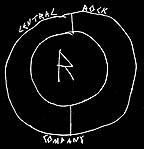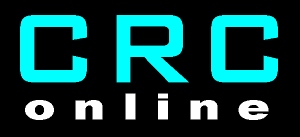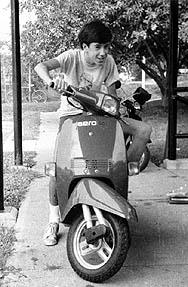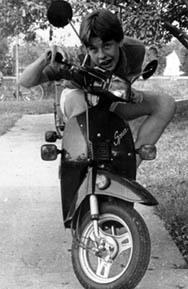



| 
|

| |
 Shay Quillen | We Are CRC "We Are CRC", as performed by Central Rock Company |  Kurt Adams |
Not Too Much of a History: The CRC Story
A Look at the Early Days of Central Rock Company
Copyright © 1985 By Edward Van Jackson
Summer 1984 - a simple time, a happy time. The trees were filled with multitudes of singing birds, the Reds had almost clenched 6th place, and Born in the USA was the #1 album in the country. It was into this environment that a musical revolution was being started in a small southeast-center town called Stateland.
Stateland is a community of about 400 people near the city of Richmond, [Kentucky]. CRC came from Millstone Drive, the main street of Stateland. Among the residents on the street are Shay Quillen, Kurt Adams, Chris Staples, Kurt's younger brother Mike, Charlie Lear, and Mike Swanagin. It was these people, with the occasional assistance of Martin Drive resident Randy Norton, that made up the band that eventually became known as Central Rock Company.
These boys spent much of their time singing along or "air banding" to their favorite records - first surreptitiously using Shay's father stereo while Shay's parents were out of town - and later using Kurt's stereo. Each member of the group added a different musical aspect: Charlie favored heavy metal, Mike Swanagin prefered breakdancing music, Randy's favorite group was Men at Work, Mike Adams liked Duran Duran, Chris liked the police, Kurt's love of Culture Club was legendary, as was Shay's love of the Beatles.
Eventually the band (still nameless at this point) decided they were ready to perform in public. The concert would be held in Kurt's basement and all of the children and teenagers of Stateland would be invited. However, vacations intervened, and the concert never came off.
Soon after this Shay was watching T.V. in his family room. A commercial came on the television. A commercial for a company - a rock company - a Central Rock Company. The group had a name - they were ready to move.
It was August 1984, and time for Shay, Kurt, and the rest of the pupils at Model Laboratory School to return to their annual quest for knowledge and fulfillment. One day, Shay was talking to friend and fellow clarinetist JLK. The topic of CRC came up, and JLK offered to manage the boys for a nominal fee (nothing). CRC was now thrown headfirst into the tough world that is the music business, and there would be no looking back.
CRC's first music with producer/manager JLK was a live song, appropriately entitled "CRC Live." Recorded on a bus coming back from the Garrad County Tobacco Festival Parade, it featured Shay and Kurt singing a medley of their favorite songs, including "Let's Go Crazy," "Mr. Roboto" and "Tainted Love." The song was critically acclaimed and became a minor hit.
The song that introduced CRC to the most ear, however, was "Not Too Much of a Cook," recorded in October and December. The first song JLK wrote for the band, it became one of their two most familiar songs for many months. Their other trademark song was one that [they] had been singing long before JLK, long before CRC, long even before Kurt and Shay ever met - a song called "Tainted Love" by Soft Cell.
Along with "Not Too Much of a Cook" and "Tainted Love," there were other gems [recorded in that time period] such as "Eppe Burgers," "You're So Crude," "Out of Step" and the apocalyptic version of "We're Not Gonna Play It," which shows Kurt suffering through an obviously painful adrenalin overdose.
At this time, CRC decided to release a promotional EP in December, which eventually came to be known as With Extra Grease [and the first album to be released from JLK Records]. The songs on this album were representative of their early music. They had very limited instrumentation, usually no more that clarinet, tuba and percussion, and were recorded on rather primitive equipment. However, what they lacked in polish, they made up for in youthful vigor and energy, and they rapidly developed a cult following.
But with success came problems - Shay became continually annoyed with Kurt's actions in the studio, Kurt was mad at Shay, Shay was mad at JLK, JLK was mad at CRC, and Miss Hasty was mad at Kay Morrisey. Would CRC handle the pressure ... or would they be destroyed in an explosion of youthful genius, charm, and good looks?
"CRC is ... it's all music, yet it's like no music that's been done before" Shay Quillen, October 1985
What Happened Next .....
Copyright © 2002 a mostly accurate retelling by Horatio Melba
In the spring of 1985, very little happened with Central Rock Company. Many believed the band had split up, or at least gotten bored with each other and wandered their separate ways. JLK managed to get the boys back together in April of 1985 to record "Polka De Pineapple," a CRC original, for the soundtrack to The Great Band Hawaiian Adventure.
In reality, the boys had come to the realization that their creative direction and improvisational skills were being stifled by JLK and the nummerous sessions in The Band Room. Remarked Shay, in an interview with P.R. Elwood from Spap Oop/Doo Dad: The Official CRC Newsletter, v.1 n.3:
"Well, you see, I also sort of have a jazz training, because, like me and the guys can spell Gene Krupa, so we figure we know a lot about that sort of thing. So what we have, we're just sort of guys who don't like to go along with what's preplanned without making up as we go along."
And so, when summer vacation approached, Shay and Kurt, using the lessons they had learned in the studio with JLK, decided to strike out on their own. A major factor for this decision was the return of Jeff Holland, a Model High School graduate and musician in his own right, to Stateland. Jeff brought to the group a unique sound on the electric guitar and keyboards that they could never have dreamed of achieving while trapped in The Band Room. Remarked Shay (in the same interview as above):
"What usually happens, like oftentimes Jeff (Holland) will be there, so assuming Jeff's there, maybe I'll have a song I want to sing, and Jeff will come here, and he'll say, 'Hey, I could figure out a guitar part for this,' and we'll spend forty minutes and he'll never figure out a guitar part ... and then, we finally get the song together and try to sing it, and Kurt will refuse to sing or something. And we'll all get real frustrated and go home crying."
In spite of all this, the trio, along with the usual handful of Stateland residents that would drop by unannounced, they managed to lay onto tape several classic CRC songs, including "Sitting in My Room," "Can You See Yourself?" and "Upon Hearing That Supergirl is Dead."
Upon returning to school in the fall of 1985, CRC teamed up with JLK to form a joint partnership, called Spap Oop Records, to release this new material. From this, a double album entitled CRC Anthology was released onto an unsuspecting public in later months of the year. JLK also was on hand for a final recording session in The Band Room, where, joined by Decembrist Uprise members Stephen Jett and William Hill, they recorded a new, and definitely improved, version of "Polka De Pineapple."
Meanwhile, sessions with Jeff in Kurt's basement continued, although with less frequency than before. By now, drummer Chris Staples had become a regular fixture in the band, and between late 1985 and 1986 they managed to crank out a handful of songs, including "I Hate Cool People" and "Stephanie."
The pinnacle in the life of Central Rock Company was the 1986 CRC Day Concert, held in Shay's back yard on the 29th of June. The performance was loud, raw, and discombobulated, as Kurt wandered away from the microphone and into the audience just three songs into the set.
It became painfully obvious at this time that playing in a band was not at the forefront of the boys' minds. The obvious distractions (high school academia, girls, cruising) and the internal conflicts were starting to take their toll. One more session was held in early 1987 which yielded "Small C.M." and "Moist," but things were nearing the end. Kurt and Shay remained the best of friends, but musically, this was pretty much the end for Central Rock Company.
A postscript: The boys did reunite in the summer of 1991 at JLK Studios where, along with an inebriated Chris Staples, they recorded an a cappella version of "My Evaline."